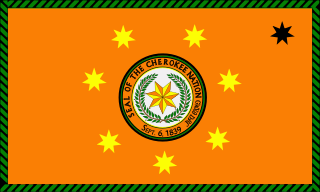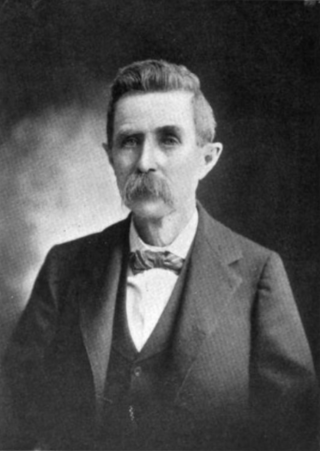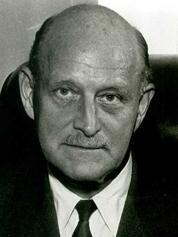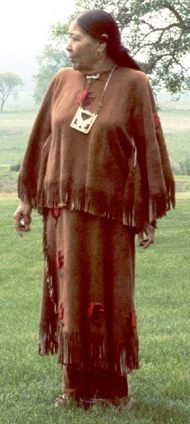
Chandler is a city in, and the county seat of, Lincoln County, Oklahoma, United States. and is part of the Oklahoma City Metropolitan Area. The population was 2,858 at the time of the 2020 census. Chandler is located northeast of Oklahoma City on SH-66 and I-44, and north of Shawnee on SH-18.

Claremore is a city and the county seat of Rogers County in Green Country, northeastern Oklahoma, United States. The population was 19,580 at the 2020 census, a 5.4 percent increase over the figure of 18,581 recorded in 2010. Located in the foothills of the Ozark Mountains. It is home of Rogers State University and is part of the Tulsa Metropolitan Area.
Robert Eugene Lavender was an American judge who served as Justice of the Oklahoma Supreme Court, serving from 1965 until 2007. He served as the Court's Chief Justice from 1979 to 1981. Lavender died on March 23, 2020, at the age of 93.

The Cherokee Nation, formerly known as the Cherokee Nation of Oklahoma, is the largest of three federally recognized tribes of Cherokees in the United States. It includes people descended from members of the Old Cherokee Nation who relocated, due to increasing pressure, from the Southeast to Indian Territory and Cherokees who were forced to relocate on the Trail of Tears. The tribe also includes descendants of Cherokee Freedmen, Absentee Shawnee, and Natchez Nation. As of 2023, over 450,000 people were enrolled in the Cherokee Nation.
Joe Byrd was the Principal Chief of the Cherokee Nation from 1995 to 1999. Byrd is bilingual, with an ability to communicate in both Cherokee and English. He ran for re-election in 1999, but lost to Chad "Corntassel" Smith. He ran again in 2003, but again lost to the incumbent Smith.

Otto Arthur Cargill was a prominent lawyer, author, politician and buffalo rancher during Oklahoma's early days. He was mayor of Oklahoma City April 4, 1923 - April 12, 1927.
The Cherokee Freedmen controversy was a political and tribal dispute between the Cherokee Nation of Oklahoma and descendants of the Cherokee Freedmen regarding the issue of tribal membership. The controversy had resulted in several legal proceedings between the two parties from the late 20th century to August 2017.
Ralph B. Hodges was born and raised in Anadarko, Oklahoma. He earned his J. D. degree from the University of Oklahoma. After serving as Bryan County Attorney and as District Judge, Hodges was appointed to the Oklahoma Supreme Court by Governor Henry Bellmon on April 19, 1965, as Associate Justice, where he would serve until his retirement from the Court in 2004. During that time he also served as Chief Justice of the Oklahoma Supreme Court from 1977 to 1978 and 1993–1994.

The National Congress of American Indians (NCAI) is an American Indian and Alaska Native rights organization. It was founded in 1944 to represent the tribes and resist U.S. federal government pressure for termination of tribal rights and assimilation of their people. These were in contradiction of their treaty rights and status as sovereign entities. The organization continues to be an association of federally recognized and state-recognized Indian tribes.

Clement Vann Rogers was an American politician and judge in Indian Territory. Clem Rogers' parents were both mixed-blood Cherokees who moved to Indian Territory in 1832, several years before the Trail of Tears. Before the American Civil War, Clem allied with the "Treaty Party", a Cherokee faction that supported signing the Treaty of New Echota. When the Civil War broke out, Clem enlisted in the Confederate Army, and served under General Stand Watie. After the war, he became active in Cherokee politics, first elected as a judge in the Cooweescoowee District, then served five terms in the Cherokee Senate. He later served as a delegate to the Oklahoma Constitutional Convention. Rogers was the father of entertainer Will Rogers.

Stephen Sanders Chandler Jr. was a United States district judge of the United States District Court for the Western District of Oklahoma.

The Delaware Tribe of Indians, formerly known as the Cherokee Delaware or the Eastern Delaware, based in Bartlesville, Oklahoma, is one of three federally recognized tribes of the Lenape people in the United States. The others are the Delaware Nation based in Anadarko, Oklahoma, and the Stockbridge-Munsee Community of Wisconsin. More Lenape or Delaware people live in Canada.

Walter White Shaw was an American football player and coach, attorney and businessman. He played at the halfback position for Fielding H. Yost's renowned 1901 "Point-a-Minute" football team. He later worked as an attorney, judge and businessman in Oklahoma and Louisiana.
James Waddey "J.W." Clark was a justice of the Oklahoma Supreme Court from 1925 to 1933. He was born in Allisona, Williamson County, Tennessee to Joseph Poindexter and Cora Belle Waddey. After finishing public school, James became a traveling salesman, then went into the mercantile business, and finally went into business for himself. He took a course in law in 1907 and 1908, then enrolled in Cumberland University in 1909. By 1910, he had opened a law practice and won election to the Oklahoma legislature. In 1912, he was elected County Attorney for Atoka County, Oklahoma and was reelected after his first two-year term expired. In 1917, he returned to private law practice in Atoka, where he remained until he won election to the Oklahoma Supreme Court in 1924, filling a vacancy and taking office in 1925. He was reelected for a full 6-year term in 1926.
William A. Berry was a Justice of the Oklahoma Supreme Court from 1958 to 1978. During World War II, Berry survived 33 months as a prisoner of war in Japan. While serving on the supreme court, he revealed corruption that became a major political scandal.
Thomas G. Andrews (1882–1942), a native of Orangeburg, South Carolina, also known as Thomas Galpin Andrews, was born to John D. Andrews and Belle Andrews on August 29, 1882. In 1904, he married Adelphia Wohlgematt, who died in 1928.
John H. Pitchford (1857-1923) was an American jurist from Walhalla, South Carolina, descended from Irish immigrant ancestors. Pitchdford was raised in Walhalla and completed his early education at Newberry College. He then studied law in a private law office, and was admitted to the bar on his 21st birthday. His first legal practice was in Clayton, Georgia, but he soon moved to the city of Gainesville, Georgia.
Wayne W. Bayless (1895-1975) was an attorney and politician from Claremore, Oklahoma, who served as a justice on the Oklahoma Supreme Court between 1932 and 1948. A member of the Democratic party, he had served previously in the Oklahoma House of Representatives, a candidate for the U.S. House of Representatives in 1924 and as a District Judge in 1926–1929.
N. S. Corn, also known as Nelson S. Corn or Nelson Smith Corn, (1884–1967) was a justice on the Oklahoma Supreme Court who was one of the central figures of the Oklahoma Supreme Court Scandal that occurred during the mid-1960s. He was accused of income tax evasion, impeached, tried, convicted, and sentenced to a prison term. During his imprisonment, he prepared a document confessing to his crimes and also provided evidence that led to the resignation or impeachment of additional justices for financial crimes while serving on the court, as well as causing the Oklahoma Legislature to reform the selection of Supreme Court justices.
The 1965 Oklahoma Supreme Court scandal was a political scandal in the U.S. state of Oklahoma involving judicial misconduct on the Oklahoma Supreme Court. Justice N. S. Corn was convicted in 1964 on federal tax evasion charges. After his conviction, he implicated himself, Samuel Earl Welch, and Napoleon Bonaparte Johnson in accepting bribes to decide cases.







